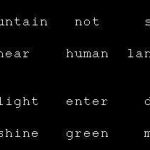2004
Derrida's territory - "discontinuities, contradictions, ambiguities, materiality, silence, space, conflict, margins, and figures" - is Bill Seaman's, as Diane Gromala notes.
Jill Walker questions who (or what) sets the rules for interaction.
Praise for the body art of Camille Utterback, and commentary on controls.
Camille Utterback's physical poetics, re-symbolized.
Matt Gorbet maintains that interactive texts remain overfamiliar to bodies trained on snowflakes and rain.
Johanna Drucker counters hands-off poetics with practice.
John Cayley replays what is literal and literary in the digital.
Computers abstract from true/false to host letters, pixels, and Nick Montfort's riposte.
Sidebar images from "Literal Art: Neither Lines nor Pixels but Letters."
Anthony Enns juxtaposes two models of German media theory in reviewing new works by Oliver Grau and Friedrich Kittler.
Jenny Weight reviews William Mitchell's third book, Me++: The Cyborg Self and the Networked City.
Jan Baetens looks 'through' and 'at' Bolter and Gromala's Windows and Mirrors and finds a foggy vision.
Joseph Tabbi reviews Joe Conte's Design and Debris and gauges the argument for chaotics-as-aesthetics across media.
Jess Loseby on "cyber-domestic" aesthetics.
Celia Pearce's position - anti-isolationist, but also anti-colonialist - derives from her understanding of "the unique properties of games themselves."
Chris Crawford considers Zimmerman's definitions.
A reply from game designer Eric Zimmerman that is receptive to multiple viewpoints, non-design or otherwise.
Jesper Juul suspects that things will remain unruly: big-budget, "cinematic" games will nose out experimental ones.
A recommendation for participatory, interdisciplinary articulations of action and perception from Mary Flanagan.
Celia Pearce hits SAVE and preserves most of Jesper Juul's essay. But then "non-computer contexts" hit the screen.

